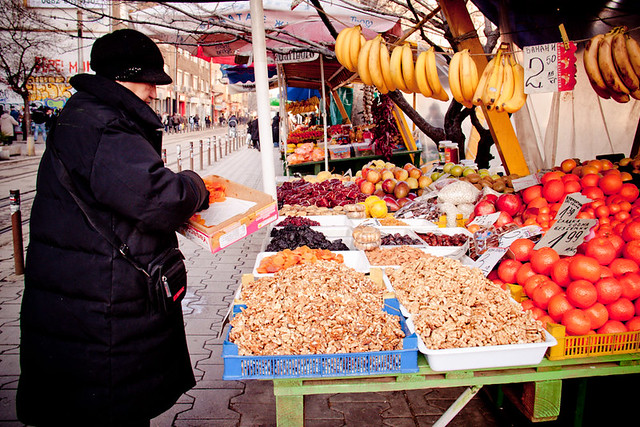When you decide you’re going to travel the world one of the first tasks you’ll need to consider will be your travel budget. Your travel budget will determine how long you can travel and the places you can go on those travels. Whether you stay in hostels and eat two minute noodles every night or whether you can visit every single tourist attraction you come across and sample all of the local delicacies!
A travel budget is different to a household budget
Once you’ve worked out how much cash you have to put towards your travels, you’ll need to work out how to keep track of it and how to make it last.
The first part of making your budget last is understanding why a travel budget is different from a normal household budget. Believe me, understanding the difference really matters if you hope to make your budget stretch as long as your travel plans!
The first major difference between the budget you might follow when you’re at home and the budget you follow on the road is accepting the realisation that no extra money is likely to be added to your travel budget. If you’ve saved for this trip and won’t be working while you’re away from home you have a set amount of funds that need to last you the whole distance. You won’t have a weekly or monthly paycheck to rely on when you are far from home. As you use up your funds they won’t be replenished and this can be very hard for people to get their head around at the start.
If you are terrible with money at home you might be used to living paycheck-to-paycheck. When you overspend on the budget you just have to wait until pay day and then you can start over.
This is a luxury you won’t have while you’re travelling. If a large sum of money is going to be tempting to you in the bank, you need to understand the implications of overspending from the very start and get this under control.
You may have decided to keep yourself a buffer of funds to get you set up when you return home again. If you don’t keep control of your budget you might have to dip into these funds and risk having no money when you finally get home. Sticking carefully to your budget means you won’t find yourself sleeping in your mum’s garage when you get back!
Budgeting for food at home is a lot easier than budgeting in a foreign country.
At home you probably do your grocery shopping in the same store in the same neighbourhood each week. You probably get the specials flyers and maybe even some discount coupons delivered to your mailbox. It’s easy to stick to your budget when you can buy in bulk if an item you often use is on special. You just store it at home in the pantry until it’s all used up. And if you’re like most families you probably eat similar meals every week. Studies show that most families cycle through the same 10 dinner dishes with little variety thrown in.
When you’re travelling, grocery budgeting is a lot harder.
When you arrive in a new area it can take a day or so to discover where the stores are that have the best deals. It can take time to find the best value street food and restaurants. If you arrive late at night you’ll most likely spend more getting the kids fed than you would if you had time to plan a meal for the family. And if your accommodation doesn’t have cooking facilities there’s a chance you’ll spend more on food than if you were able to prepare it for yourself.
Travel budgets include different categories and expenses than household budgets, expenses that can vary widely.
Household budgets include a lot of items that have no place in a travel budget. Items like power, car insurance, car registration, car maintenance, home phone, household items and loan payments (unless you’re travelling with some debt still unpaid) are all parts of a household budget that generally don’t need to be paid while you travel.
Your travel budget will consist mainly of 4 categories accommodation, food, transport and entertainment. Once you allow for these you’ve pretty much covered what you need to consider. For our year-long budget the entertainment category covered everything besides food, accommodation and transport – it was easier for us that way!
In your household budget most of your expenses will be fixed. If they aren’t fixed costs you can likely work out what they are expected to be and put a fixed amount aside for them each pay period. This is not quite the case with a travel budget. Accommodation for one month in South East Asia could be very different to your accommodation expenses the next month in Paris. And if you manage to get yourself a house-sitting assignment you could find yourself with a sudden budget windfall!
Juggling expenses that aren’t fixed is a definite skill you’ll need to master if your travel money is to last the distance.
When you sell your possessions to travel and give up your residence, you will save the money you might have spent on insuring your stuff and your house. But you’ll need travel insurance which could be something new for you. Travel insurance is generally a one-off expense for the time you will be travelling. So you won’t need to budget for it each week you are away. Instead, it will come out of your pre-trip funds.
You absolutely must cover yourself for medical emergency and evacuation when choosing your travel insurance but the amount of cover for any gadgets you cover is up to you. If you decide to travel with your old electronics and not upgrade them for your trip then the basic cover that is included with most policies will be sufficient. If you have brand new items you may need to cover these individually. If you are travelling with expensive jewellery you’ll most likely have to insure it separately or risk it not being covered should it be lost or stolen.
A small amount might also be needed to be put aside to repair any of your gadgets that break on your journey. Travel insurance doesn’t normally cover breakage so you’ll need to consider this ahead of time too.
So there you have the difference between household and travel budgets. Once you realise that your household budgeting habits of your home will have to be adjusted to keep your budget on track on the road, you’ll be much better prepared to keep control of your cash.
The last thing to consider when planning your budget for a travel adventure is that when you run out of cash you have to go home. Nobody wants to go home early and this is the best incentive for getting control of your money that I can think of!
Here’s the second article: Budgeting: How to make sure your travel budget is realistic and you really can stick to it.






